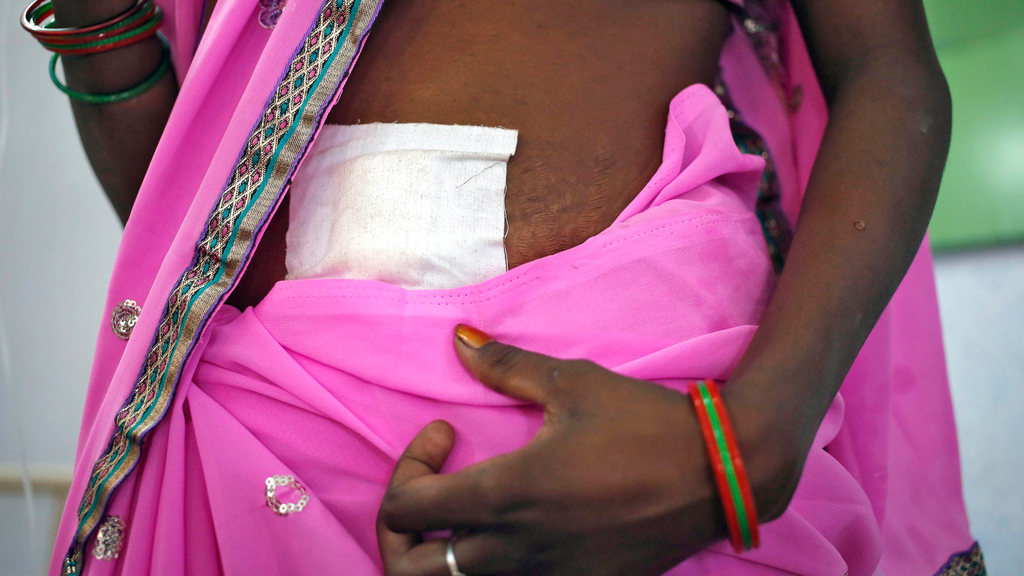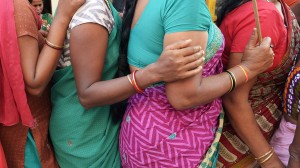Lack of proper health care facilities for female sterilization in India

A woman, who underwent sterilization surgery at a government mass sterilisation “camp”, walks to sit in a hospital bed at a district hospital in Bilaspur, in the eastern Indian state of Chhattisgarh, November 13, 2014. © Reuters/M. Mukherjee
Women in rural India continue to lack access to proper family planning services. This issue came under spotlight with the tragic death of 16 women who were sterilized in a health camp in the northeastern State of Chhattisgarh in November 2014. The doctor who had performed the surgeries confessed in an interview that he had a history of completing 200-300 surgeries a day. It was also reported that women were given no follow up care.
Local governments often push sterilizations by offering a monetary compensation or material incentives in return for women who volunteer themselves for sterilization. Reports have highlighted the fact that women are soft targets for health workers in the country’s patriarchal setup. Indian media has also frequently reported on the inhuman conditions in ‘cattle camps’ where women are coerced to undergo sterilization without proper information. The International Center for Research on Women (ICRW) recently conducted a study and unveiled the deplorable conditions of health facilities in the state of Bihar.
ICRW Regional Director Ravi Varma told WTO that despite the grim reality there has been considerable improvement in the healthcare facilities over the last decade. “There has been an availability of outreach workers who attend to the maternity needs of pregnant mothers in the rural areas and there have been mobile vans connecting women in need of maternity services and connecting them to the public healthcare system.”
Varma believes that the system is overwhelmed because of the lack of coordinated planning with the rural family planning centers. “For example at the sub center level of the primary healthcare, if they have to meet certain targets of women undergoing sterilizations, those targets are not based on the realistic assessment on the needs of the rural area. There may be women needing other birth control services rather than sterilization. But since there is a predetermined target, at local level they tend to ignore the data for family planning services,” stated Varma.
The ICRW report’s findings show that “women and community members are seldom educated on what defines quality care in health facilities”. It highlighted critical gaps such as the lack of adequate number of beds and toilets as well as equipment and drugs needed for sterilization services. The ICRW report’s findings further revealed that the hospitals lacked trained doctors and nurses and those on duty were overworked.
The biggest challenge however remains the lack of educational programs, campaigns and awareness efforts. The rural women interviewed during the ICRW study had little knowledge about their rights and entitlements and on what defines quality care at health facilities but if that were to change with increased awareness, both public and private healthcare systems could be made more accountable.
Author: Roma Rajpal-Weiß
Editor: Marjory Linardy
Roma Rajpal-Weiß is an Indian Blogger and Journalist and can be followed @romarajpal
WTO RECOMMENDS
Rajasthan introduces sterilization incentive scheme
A steady stream of women who have already had children are keeping Rajasthan’s government hospitals in a tube-tying whirl after authorities came out with a plan to help slow the baby boom. (From December 29, 2011)
India’s single women
Over the years, the guiding principle that has helped women like Shabnam, Kanku Bai and Dhuli Bai tide over the really tough times they have faced as single women living in a largely conservative social set up. Every time someone has tried to sideline them or deny them their entitlements they have come together and raised their voice against the injustice instead of blaming their misfortunes on destiny. (From August 20, 2014)
Health is wealth
It is rightly said that “Health is wealth.” Without it, everything seems less important and futile. India is a rapidly developing country, but its health care system is still ailing and struggling to stand on its feet. Women Talk Online blogger Isra Bhat spoke to the Chief Executive Officer of the Voluntary Health Association of India (VHAI), Mr. Alok Mukhopadhyay, and tried to find out about the key steps that can be taken to make the health sector of India better and reliable. (From October 2, 2013)







